With a career spanning Bouchon Bakery, Lincoln Ristorante, b.Patisserie, and Hart Bageri, Guild Member Susannah Schoolman has worked in some of the world's most renowned pastry kitchens. Her expertise in laminated doughs and viennoiserie has shaped her approach to cooking and baking. Today, she's pioneering the plant-based pastry and cooking movement as the Founder and CEO of Tourlami, a plant-based butter designed for professional kitchens.
In her upcoming Guild class at the Institute of Culinary Education in New York, Susannah will teach plant-based lamination techniques–helping bakers master flaky croissants, brioche, and puff pastry. Susannah is proving that laminated doughs can be just as flaky, structured, and delicious without dairy.
We recently spoke with Susannah about her journey into the world of baking, the challenges of plant-based butter, and what excites her about the future of plant-based baking.

How did you get started in pastry?
I always knew I wanted to be in this industry. Even as a kid, I was obsessed with watching the Food Network. I went to a cooking camp in middle school, and I just loved baking. I started working in kitchens when I was 18, and pastry was always my focus. It was the part of baking I was most drawn to.
What led you to specialize in laminated doughs?
Laminated doughs are one of the most technical and rewarding aspects of pastry. There's no way to fake it...either you get the layering, structure, and crispness right, or you don't. It requires precision, temperature control, and patience. When you achieve that perfect honeycomb structure in a croissant, it's incredibly satisfying.

You've worked in some of the most prestigious bakeries. How did those experiences shape your approach to pastry?
My time at Bouchon Bakery, Lincoln Ristorante, b.Patisserie, and Hart Bageria gave me a deep understanding of ingredients, technique, and production processes. Each of those kitchens had different approaches to laminated doughs, and I learned to appreciate the nuances of different butters, proofing methods, and shaping techniques.
After I moved to Copenhagen to work at Hart Bageri, I was exposed to even more styles of baking, and I saw how much variation existed between different regions and traditions. But one thing was constant, lamination depends on high-quality butter that performs consistently.

What role does butter play in laminated doughs and why was it so important to develop a plant-based alternative?
Butter is everything in lamination. Its plasticity and the ability to stay firm yet pliable...it determines whether you get flaky, structured layers or a collapsed, greasy mess. If butter is too soft, it melts into the dough; if it's too firm, it cracks and creates a gap.
When I went plant-based about eight years ago, I quickly realized there were no professional quality plant-based butter that could withstand the demands of laminated doughs. Most of the options available were designed for general consumer use, not for professional pastry chefs who need butter to perform consistently in lamination, viennoiserie, and enriched doughs.

What are some of the most common mistakes bakers make when laminating dough, especially with plant-based butter?
Over-handling the dough is another issue. Laminated doughs need careful, intentional movements, every fold and roll-out affects the final product. Too much press or too many unnecessary turns will overwork the gluten and compress the layers, making the pastry dense instead of light and airy.
What is some advice you have for aspiring bakers that are trying to walk this fine line between sustainability and craft?
For me, when it comes to sustainability, it's more about waste reduction. There are all these resources that went into making every single ingredient whether it's through labor, water, or soil. So, it's about being mindful of how product is being used.
Think about some swaps for ingredients you can make that don't change the product but make a more positive impact.

Why do you think plant-based pastry is becoming essential to professional kitchens?
Plant-based pastry is about accessibility, not just veganism. There are so many people who need dairy-free options, whether it's for allergies, dietary restrictions, or personal preference. And the reality is, if a bakery doesn't have high-quality plant-based options, they're losing customers.
But for plant-based pastry to work in professional settings, it has to be just as technically refined as traditional pastry. That's what we're working on, ensuring that plant-based pastries are equal in quality, taste, and execution to their dairy-free counterparts.
What's next for you?
I’m focused on education, chef collaborations, and expanding my reach to more professional bakers. I want to make plant-based pastries and cooking just all around more approachable.
Beyond that, I’m continuing to refine new product formulations that will help fill in other gaps in plant-based baking and cooking. There's still so much room for innovation in that space.
Register for Modern Vegan Baking here. The class has a particular focus on plant-based lamination, and we will explore vegan substitutes for common bakery ingredients.
Follow Susannah and Tourlami for more plant-based baking.
